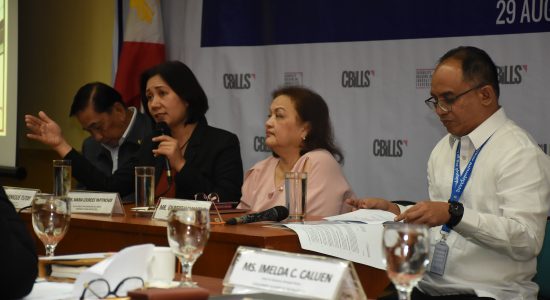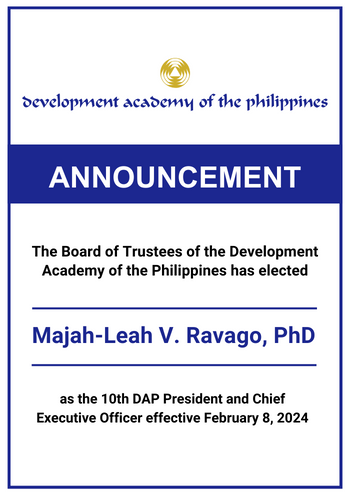
(Left to right) Employers Confederation of the Philippines President Sergio Ortiz-Luis, Department of Labor and Employment-Bureau of Local Employment Director Dominique Rubia-Tutay, Department of Trade and Industry-Bureau of Trade and Industrial Policy Research Director Maria Lourdes Yaptinchay and Development Academy of the Philippines-Center for Governance Director Gilbert E. Lumantao during the panel discussion of the lecture series on socio-political and economic perspectives under the CBILLS program last August 29 at the House of Representatives in Quezon City. (Photo by Ped Garcia)
The Development Academy of the Philippines, through its Center for Governance, launched the lecture series on socio-political and economic perspectives under the Capability Building on Innovative Leadership for Legislative Staff (CBILLS) program through the session on “The Future of Work on FIRe (Fourth Industrial Revolution): Implications on the Philippine Labor Force,” last August 29 at the House of Representatives in Quezon City.
The lecture series is an elective session of the CBILLS that aims to promote the discipline of long-term planning and provide a venue for discussing strategic issues that affect socio-political and economic governance. It also intends to broaden the participants’ perspective on key trends and developments in the socio-political and economic spheres of the country as well as deepen their understanding of the impact of these trends on socio-political and economic governance.
Dr. Jose Ramon G. Albert, senior research fellow at the Philippine Institute for Developmental Studies, handled the session on “Understanding the FIRe (or Industry 4.0): Implications on People, Society and Social Security.” He emphasized that investments in research and development, hard and soft infrastructure, institutional and human capital development are all complementary to foster and improve the innovation ecosystem that, in effect, would help ensure inclusive development and enhance readiness of the Philippine labor force for the future of work.
Meanwhile, Dr. Elmer P. Dadios, university fellow and professor at the De La Salle University, discussed the major contributions of science and technology in fostering socio-economic growth and industrialization as well as the challenges experienced by the inventors and innovators in promoting such discipline and practice in the country during the session on “The Roles of Science and Technology on Industry 4.0.”
Director Maria Lourdes Yaptinchay of the Department of Trade and Industry-Bureau of Trade and Industrial Policy Research, Director Dominique Rubia-Tutay of the Department of Labor and Employment-Bureau of Local Employment and Mr. Sergio Ortiz-Luis of the Employers Confederation of the Philippines presented their respective agency’s perspectives and initiatives in a panel discussion on preparing the Philippine labor force for Industry 4.0. Moderated by DAP’s Center for Governance Director Gilbert Lumantao, the panel highlighted the importance of a multi-stakeholder approach particularly a strong government-academe-industry collaboration to create more conducive environment to upgrade skills and facilitate the transition to Industry 4.0 and prepare the labor force in the gradual change in nature of work.
The lecture was attended by the participants from the middle managers and senior leaders track of the CBILLS program. – Jeanena Mae Rafer




